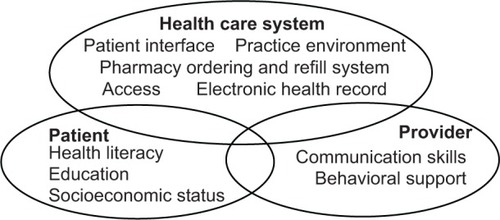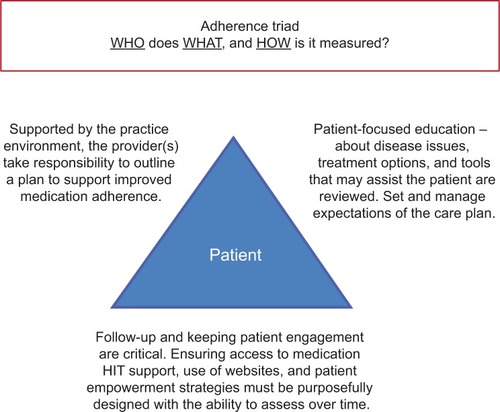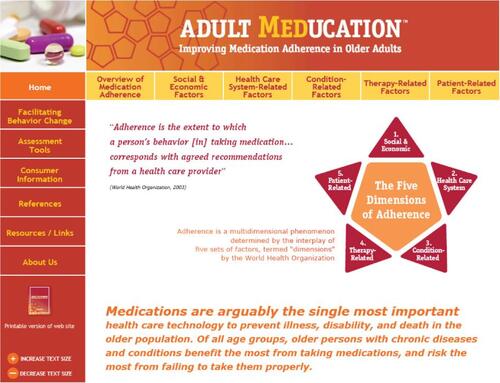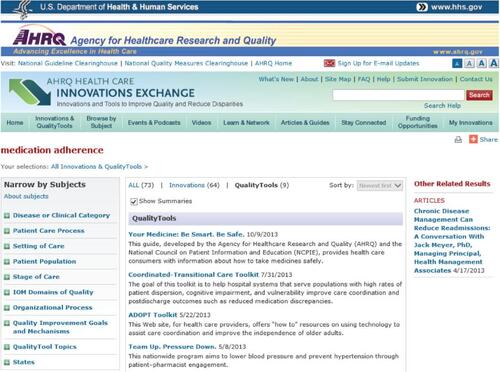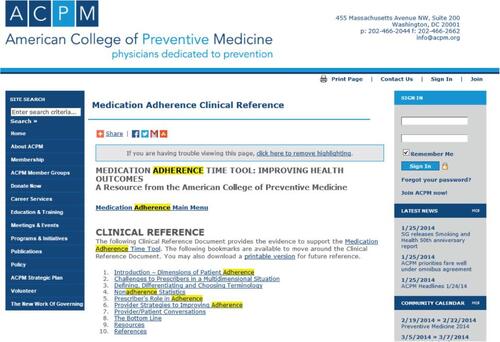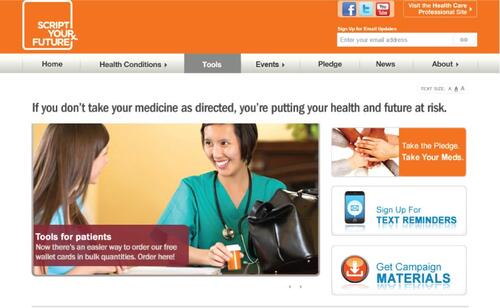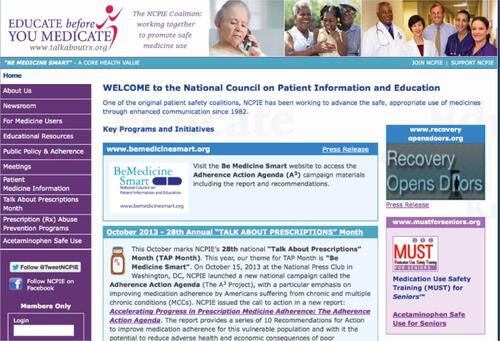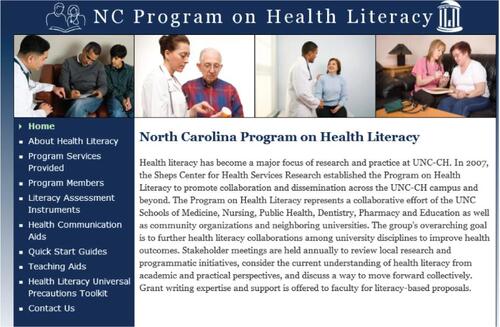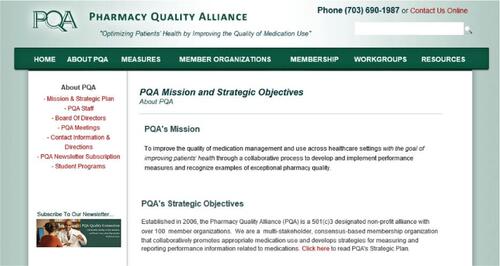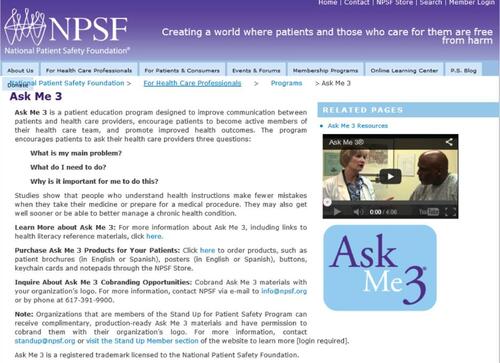Abstract
Improving medication adherence is a critically important, but often enigmatic objective of patients, providers, and the overall health care system. Increasing medication adherence has the potential to reduce health care costs while improving care quality, patient satisfaction and health outcomes. While there are a number of papers that describe the benefits of medication adherence in terms of cost, safety, outcomes, or quality of life, there are limited reviews that consider how best to seamlessly integrate tools and processes directed at improving medication adherence. We will address processes for implementing medication adherence interventions with the goal of better informing providers and health care systems regarding the safe and effective use of medications.
Improving medication adherence – an important unmet need and process of care
In the recently published National Community Pharmacists Association report on medication adherence, the cost of medication nonadherence in 2009 was estimated at $290 billion in the US.Citation1,Citation2 In addition to cost issues, and perhaps more compelling, are the potential clinical ramifications of medication nonadherence. Safety issues and suboptimal patient outcomes associated with poor medication adherence are estimated to impact 133 million Americans with at least one chronic disease.Citation3 There is an increasing business case for addressing medication nonadherence as payment and delivery system models evolve to place providers at risk for longitudinal patient outcomes and downstream costs (eg, bundled payments and accountable care organizations), providers’ interest in care coordination and durable treatment inventions expand.
Ongoing policy changes have resulted in a greater focus on individuals and medication adherence. The Health Information Technology for Economic and Clinical Health Act passed in 2009 as part of the American Recovery and Reinvestment Act, for example, authorizes an estimated $30 billion in incentives to eligible professionals and hospitals that adopt and meet federal standards for the meaningful use of certified electronic health record (EHR) technology.Citation4 Meaningful use includes functions such as e-prescribing, reporting clinical quality measures, clinical decision support, and the electronic exchange of clinical messages between providers. The Health Information Technology for Economic and Clinical Health Act authorized another $2 billion to develop and support the nation’s health information technology (HIT) infrastructure and capacity to engage in the electronic exchange of health information. This included technical support for the adoption, maintenance, and meaningful use of EHR systems. Additionally, current Centers for Medicare and Medicaid Services Accountable Care Organization performance standards include: enhanced patient experience (often associated with provider–patient communication); chronic illness disease control; and provision of preventive services. Last, increased attention on patient medication adherence has occurred because of the new Medicare Advantage Part D five-star quality rating system for medication adherence for 2014, which has recently been issued requiring all health care plans to have a four or better rating.Citation5 Health plans earning four or five out of five available stars can receive bonus payments to be used to enhance benefits or lower future plan premiums to attract additional members. As part of Medicare Advantage Part D five-star quality-rating system, adherence to medications for hypertension, diabetes, and cholesterol are routinely examined as part of the Drug Pricing and Patient Safety Program.
The many facets of medication adherence – simplifying the equation
Many factors account for poor medication adherence ranging from patient socioeconomic status to provider training. For example, existing models of chronic disease managementCitation6 and behavior changeCitation7 are informative, but our review takes a new approach. We combine the concepts of the health care system, patient and practice team from the Wagner Chronic Care Model,Citation6 views from Michie et alCitation7 such as regulations and service provision, and perspectives from our own work to create this process plan for implementation. For the purpose of the review, we present a holistic plan to address medication adherence, focusing on three core components: 1) patients; 2) providers; and 3) health care practices.
It is important to consider a few basic concepts. First, each patient is unique with specific clinical, educational and economic needs, and situational factors. Second, providers include physicians, nurses, pharmacists, or other allied health professionals who work collaboratively and contribute to care delivery. Last, for the purpose of this review, the terms “practice”, “health care system”, or the “health care plan” are interchangeable for this review, as the “system” must provide support to the providers and the patients in some meaningful way to address and improve the use of medicines as part of an overall treatment plan. These components form the critical relationship that drives engagement resulting in behavior change that will make a difference to improving medication adherence and patient outcomes (). “Better information, communication, and patient support have been shown in previous studies to increase patients’ engagement and involvement in their health care, their satisfaction.”Citation1 We begin with a case study and then discuss each component of the three core components (ie, patients, providers, and health care practices).
Case study: anticoagulation in stroke risk reduction – current and future options
In their recent study, Brown et al present a conceptual model for adherence to warfarin by combining insights from patient focus groups and a comprehensive literature review.Citation8 As with any adherence challenge, this analysis looks at the multiple therapeutic and patient considerations to determine which influencers affect adherence to oral anticoagulation. This provides an overview of the multiple facets of improving adherence in anticoagulation. These are then replicated in our proposal for the emerging clinical coordination of patients with atrial fibrillation (AF); multiple influencers of medication use are brought together when a coordinated team-based approach is employed as outlined in our approach.
Based on the lessons learned, the process of adherence is impacted by: the patient’s disease knowledge and ongoing support from the health care team; the balance between short-term avoidance of adverse events (eg, bleeding) or longer-term benefits (eg, reduction of stroke risk); developing a routine with therapy that may include external reminders; and patient self-efficacy. So, indeed, the use of anticoagulation with warfarin in reducing the stroke risk associated with AF provides a compelling story of medication use, misuse, and nonadherence.
It is well-appreciated that warfarin provides an impressive risk reduction for stroke inpatients with AF, particularly as the associated criteria of congestive heart failure, hypertension, age, diabetes, and prior stroke/transient ischemic attack – also known as the CHADS2 risk score- are included.Citation9 The non-and underutilization of warfarin in patients with a diagnosis of AF is common and costly, according to a recent analysis by Casciano et al resulting in increased inpatient and total health care costs.Citation10
It is generally accepted that only 50% of the patients who are eligible for warfarin are actually prescribed the drug for a variety of reasons. Most prominently, however, it is the consideration for the benefit of treatment versus the risk of major or minor bleeding events.Citation11,Citation12 There are often complex patient care considerations when using warfarin, such as bleeding, that necessitate monitoring. Anticoagulation clinics emerge as a way to address this problem. Patients develop consistent contact with a provider, are given comprehensive education about their illness and the treatment, and are expected to evaluate the care progress approximately once monthly. A challenge remains that only one-half of the patients prescribed warfarin in the US have access to specific clinical providers, as described previously. While the aforementioned specialized clinics improve warfarin utilization, challenges remain in terms of safety and nonadherence that are associated with warfarin use. Access to specialized services is limited, and – as published in 2011 – adverse event data from a national data set reveals that warfarin was most often implicated in the emergency hospitalization of adverse drug events.Citation19 Ultimately, improving anticoagulant adherence issues will avoid harm and improve outcomes in an often at-risk patient population.
What are the key lessons and practices that might improve adherence to warfarin as well as the newer approaches to anticoagulation? If we understand that improved adherence results in a more stable treatment response and reduced variability in overall patient response, then how should we proceed? The quality of care associated by structured support to patients who are prescribed warfarin is quantified by the percentage of patients who were kept in the therapeutic range. Clinical services provided by the specialty care pharmacist both identified the ability to improve care quality as measured by time in the therapeutic range and also reduced anticoagulation-related emergency room visits and hospitalizations.Citation13
Coagulation clinics are opting out of the traditional clinic and moving to a service line, focusing on AF and preventive services, which not only include the management of anticoagulation, but they also address common concurrent therapies, such as antiarrhythmic monitoring as well as common comorbidities associated with AF, including hypertension, diabetes, and coronary disease. These service lines can be managed by advanced practice clinicians, such as nurses or pharmacists, collaborating with both specialists and primary care physician providers. Thus, as in diabetes care, a range of services can be provided or coordinated by well-trained midlevel practitioners and address often complex patient needs and behaviors, inclusive of proper medication usage and adherence.Citation14 As suggested in , a series of clinical issues or therapeutic challenges may be identified by a core/planning team who is responsible for identifying outputs. In this case, we also link educational support directed at the patient to – in part – address the therapeutic challenge and link inclusion into the medical record for verification across clinical services. Last, items of measurement need to be attached as part of focused quality improvement process in support of improved medication adherence.
Table 2 Process to evolve clinical services in AF
Case study: HIT and lipid management
In a recently published analysis encompassing 34 trials with more than 84,000 enrolled patients, the impact of HIT to address quality gaps, including medication adherence, was evaluated in patients who required lipid management.Citation15,Citation16 HIT intervention processes (eg, screening, testing, drug initiation, titration, adherence, and/or referrals) were evaluated. Although a range of effects was found, more than one-third of the studies determined that an HIT intervention could impact outcomes. A core principle of this analysis was that the tools employed need to provide connectivity of the patient to the health care systems, as well as targeting providers and systems to improve lipid treatment, adherence, and quality. While any number of interventions may provide short-term value – particularly in practices and populations with low baseline adherence and low-density lipoprotein cholesterol control as a baseline consideration – long term effects may depend on longer-term support and follow-up as allocated in the study design. Ultimately, intervention modalities that connect patients to the health care system may be more likely to provide practices with an unappreciated resource to improve lipid management, including adherence and low-density lipoprotein cholesterol control, resulting in a more patient-centric approach to disease management and treatment support.
Patient, provider, and health care system
The patient enters the health care system based on a wide range of possible circumstances – be it symptoms of a disease, preventive services, or often-unspecified concerns about their health or well-being. These encounters are also influenced by the nature of a practice environment, ranging from a primary care orientation to specialized clinical services, where there may be not only a unique focus on clinical issues (eg, cardiovascular disease), but also access to a broader range of clinical providers, such as nurses, pharmacists, cardiac rehabilitation professionals, and others who engage with the patient in addition to the physician. Each of these types of providers may bring a unique skill-set and perspective. For example, in the US, clinical pharmacists may be specially trained experts in medication monitoring;Citation17 in other countries, the role of pharmacists may be even greater. Consider the concept of the patient-centered medical home, where there is an increased level of support from HIT and decision support, continuity and coordination of care, and accountability by the health care system – all which emphasize a patient-focused and team-based approach to health care delivery.Citation18 By adapting this model across the health care system, we can achieve connected and accountable care for patients that includes the appropriate use of medications ().
Table 1 Connectedness of patient, provider, and health care system
Transition to principles of medication adherence
Once the case to improve adherence has been made, what might a practice do to develop a medication adherence improvement plan? Given the many challenges within the delivery of health care, including time, patient-specific resources, and lack of adequate reimbursement, the ability to further incorporate medication management as a component of care becomes even more challenging. Given that the problem of poor medication adherence is multifactorial, effective medication adherence programs need to adopt an approach that involves several proven strategies. Several evidence reviews have identified interventions effective in promoting both overall and condition-specific medication adherence.Citation19–Citation21 While no universal formula will improve medication adherence in all settings, several ingredients are essential for any well-designed medication adherence improvement intervention. These ingredients include: improving patients’ understanding of their treatments; providing counseling and accountability by the health care team; ensuring that there are tools and strategies to assist patient self-monitoring; and increasing access to affordable medications.Citation21 There is a strong evidence base showing that the interventions that increase the patients’ knowledge of medicationsCitation22 and support behavioral change – coupled with medication managementCitation23 – are effective at improving medication adherence.
Approaching patient, practice, and provider – the adherence triad
Building upon the three components of the health care schema – the patient, the provider, and the practice – we now develop the concept of the adherence triad (). The provider role is central to achieving buy-in and process improvement, keeping treatment regimens simple and focused. Provider behavior change is reflected in the actions necessary to impact medication use. Training in the areas of health literacy, motivational interviewing, and information technology is useful for health care professionals to help educate and support their patients. The patient has a role to engage on different levels: with personal knowledge and support systems; with the provider before, during, and after the encounter; and the system to navigate and facilitate their own care success. The practice (system) has a role to encourage an environment where all the stakeholders understand the end game and provide simple seamless support mechanisms to improve patient care, outcomes, and satisfaction with the provision of care.
There are two keys to engagement for all members of the adherence triad. These are simplicity and fluidity. First and foremost, keep it simple. The responsibilities of each member of the adherence triad must be clearly articulated and understood. Ownership for each activity, the timing of it, and how it will be measured is vital to ensure that the patient care objectives are met. There must be fluid two-way communication between all parties to ensure effective communication. The communication continuum should be nondisruptive and should seamlessly integrate into a given practice environment. The assessment of goals and objectives is important to know whether all triad members are engaged and to make adjustments in real-time as needed. Each member of the triad should know what is expected and how best to evaluate success in meeting the long-term goals of success.
There are several key questions that must be considered when evaluating success. For example, is the evaluation of success comparable between the patient and their provider? How can the provider ensure the plan is understood and accepted by the patient? How can the patient, including his family and caregivers, be sure that the provider understood his priorities, challenges, and goals for treatment? How does the health care system maintain a process of ongoing quality improvement? There are many possible answers to the questions and no one-size-fits all solution. The tools and resources must be selected, based on the specific practice environment.
Tools and resources
The triad must organize tools and resources to facilitate medication adherence with a specific eye toward the unique needs of the patient. Patient education and methods for addressing modifiable patient-level factors that may influence adherence, such as health literacy, must be addressed. There are many patient educational resources – including medication instruction sheets, personalized medication calendars, streamlined pictorial bottle labels, and simple reminder systems – that can inform patients about their medication at a level aligned with their health literacy level.Citation24,Citation25 Technology provides many tools and resources that may facilitate improved adherence, including pill monitoring systems, mobile health technology, online resources, social media, and electronic health records, among others.Citation26
Harnessing technology can also impact the frequency of patient–provider contact and ensure accountability. While there is no one universally established solution to foster proper medication adherence, HIT can inform numerous strategies to monitor adherence and improve rates, to inform patients’ self-management, health care service planning, and health policy decision making. Studies are increasingly demonstrating that the use of IT can improve health outcomes and facilitate improvements in the quality and the coordination of care.Citation19,Citation20 Two common examples of HIT are e-prescribing, or the electronic generation of a prescription and its process for being filled at a pharmacy, and EHR systems.
When medication adherence tools and resources are used by the patient, understood by the provider, and endorsed by the practice, they form an important part of the plan to improve medication use. Through the adoption of HIT solutions, adherence tools can also be used to ensure accountability of the triad both internally to its own members and externally to the broader health care delivery system. This can be used to inform a learning health care organization focused on continuous quality improvement.
Concluding remarks: plans to implement a medication adherence program
When developing and implementing a medication adherence improvement program, it is important that providers and health care systems consider three key questions. Have you identified medication adherence as a priority within your practice or organization? How do you want to affect medication use in your patient (population)? What are the available resources in terms of people, process, and investments to achieve your medication adherence goals? To examine these issues, providers and health care systems may form a working group to further evaluate the components of care within their specific practice environment. It is important to assess the available resources relative to the objectives in developing a plan; start small, perhaps focusing on specific patient population, disease area, or clinic space. Finally, be certain to incorporate a quality improvement approach at the onset of the program to measure, monitor, and adapt the program to meet potentially evolving patient care objectives. The Supplementary materials provide specific examples of web-based quality improvement agencies and resources, such as the Agency for Healthcare Quality and Research – Innovations Exchange and Pharmacy Quality Alliance ().
Supplementary materials
Review of adherence-related websites
Adult Meducation: Improving Medication Adherence in Older Adults
Available at: http://www.adultmeducation.com/
The American Society on Aging (ASA) and the American Society of Consultant Pharmacists (ASCP) Foundation have collaborated on the development of Adult Meducation: Improving Medication Adherence in Older Adults, a web-based program () to educate ASA and ASCP members on important aspects of medication adherence in older adults. One goal of the program is to encourage ASA members to work together with ASCP member pharmacists to identify, resolve, and prevent medication nonadherence in the older adults served by community-based service providers. This website contains:
Information on factors that influence medication adherence, barriers to adherence, and specific strategies to improve adherence
Tools to identify older adults at risk for medication nonadherence
Resources to improve medication adherence
Materials to educate older adults about the importance of medication adherence
Educational programs targeted at community-based service providers and health professionals
Links to other useful web resources
Materials on the website that can be copied or downloaded for use in educational or training programs
Agency for Healthcare Quality and Research – Innovations Exchange
Available at: http://innovations.ahrq.gov/index.aspx
In addition to user tools and project descriptions on a wide range of clinical issues, the website () provides specific tools and research summaries in the area of medication adherence, which can be utilized by clinicians and researchers alike.
American College of Preventive Medicine
Available at: http://www.acpm.org/
The American College of Preventive Medicine provides a website () directed at providers to educate about the complex challenges of medication adherence with an additional summary of resources and tools, which may be incorporated into the practice environment.
Script Your Future
Available at: http://www.scriptyourfuture.org/
The Script Your Future campaign is a national public education campaign developed to raise awareness among patients, their family caregivers and health care professionals, about the importance of taking medications as directed. The campaign, led by the National Consumers League, focuses on patients affected by three serious chronic conditions – diabetes, respiratory disease, and cardiovascular disease. Script Your Future educates patients about the consequences of poor adherence, encourages patients and health care professionals to better communicate about medication, and offers tools and resources to help improve adherence. The interactive Script Your Future website (), offers tools for both patients and health care professionals, including fact sheets on chronic conditions, charts to keep track of medications, videos, sample questions, text message alerts, and more.
Launched in May 2011, this unique three-year national campaign has targeted outreach efforts in: Baltimore, MD, USA; Birmingham, AL, USA; Cincinnati, OH, USA; Providence, RI, USA; Raleigh, NC, USA; and Sacramento, CA, USA. In addition to the website, the integrated campaign includes public service announcements, material dissemination, social media presence, health professions, and student out-reach activities. Script Your Future is supported by a coalition of more than 130 public and private partners.
National Council on Patient Information and Education
Available at: http://www.talkaboutrx.org/
Founded in 1982, the National Council on Patient Information and Education (NCPIE), located in Rockville, MD, USA, is a nonprofit multistakeholder coalition working to stimulate and improve the communication of information on the appropriate use of medicines to consumers and health care professionals. NCPIE, since its beginning, has strongly advocated for the medicine education team – considering the patient the key player. NCPIE develops and provides valuable patient education programs and educational resources promoting the latest advances in communication research and practice. NCPIE’s public-facing websites () include: talkaboutrx.org; bemedicinesmart.org; bemedwise. org; mustforseniors.org; and recoveryopensdoors.org
NCPIE works to address critical medicine safe use issues like adherence improvement, prescription drug abuse prevention, treatment and recovery, medication error reduction, quality improvements in health care provider–patient medicine communication, and safe storage and disposal of medicines.
With mounting evidence that poor medicine adherence will increase dramatically with the projected rise in age-related chronic illnesses, NCPIE released a nationwide call to action – the Accelerating Progress in Prescription Medicine Adherence: The Adherence Action Agenda (October 2013) – that places a spotlight on the pervasive and costly problem of poor medicine adherence, particularly among those age 65 and older with multiple chronic conditions, who are at the greatest risk of medication errors, drug interactions, and costly disease complications.
North Carolina Program on Health Literacy
Available at: http://www.nchealthliteracy.org/
Health literacy is defined as the degree to which individuals have the capacity to obtain, process, and understand basic health information and services needed to make appropriate health decisions. The concept of health literacy differs from literacy itself. Health literacy requires basic reading skills, but it also requires the ability to understand oral communication, use numbers and math skills, understand how to navigate the health system on a basic level as well as the ability to communicate with health care providers and their staff. To that end, the University of North Carolina School of Public Health has provided an extensive list of tools and resources to help clinicians better understand and implement good practices of health literacy ().
Pharmacy Quality Alliance
Available at: http://www.pqaalliance.org
Established in 2006, the Pharmacy Quality Alliance is a 501(c)(3) designated nonprofit alliance with more than 100 member organizations (). The Pharmacy Quality Alliance is a multistakeholder, consensus-based membership organization that collaboratively promotes appropriate medication use and develops strategies for measuring and reporting performance information related to medications. Their mission statement is clear:
To improve the quality of medication management and use across healthcare settings with the goal of improving patients’ health through a collaborative process to develop and implement performance measures and recognize examples of exceptional pharmacy quality.
National Patient Safety Foundation (NPSF)
Available at: http://www.npsf.org/about-us/
The NPSF’s vision is to create a world where patients and those who care for them are free from harm. A central voice for patient safety since 1997, NPSF partners with patients and families, the health care community, and key stakeholders to advance patient safety and health care workforce safety and disseminate strategies to prevent harm. NPSF is an independent, not-for-profit 501(c)(3) organization. Among their resources is a unique clinician–patient interface tool called Ask Me 3 (), which allows a quick effective engagement with patients regarding medication adherence.
Disclosure
The authors have no conflicts of interest to declare in respect of this work.
References
- National Community Pharmacists AssociationMedication Adherence in America: A National Report 2013Alexandria, VANational Community Pharmacists Association2013 Available from: http://www.ncpanet.org/pdf/reportcard/adherencereportcard_abridged.pdfAccessed December 11, 2013
- New England Healthcare InstituteThinking Outside the Pillbox: A System-wide Approach to Improving Patient Medication Adherence For Chronic DiseaseCambridge, MANew England Health Care Institute2009 Available from: http://adhereforhealth.org/wp-content/uploads/pdf/ThinkingOutsidethePillbox_Report.pdfAccessed January 14, 2014
- RoebuckMCLibermanJNGemmill-ToyamaMBrennanTAMedication adherence leads to lower health care use and costs despite increased drug spendingHealth Aff (Millwood)2011301919921209444
- BlumenthalDTavennerMThe “meaningful use” regulation for electronic health recordsN Engl J Med2010363650150420647183
- Medicare.gov [homepage on the Internet]Plan Quality and Performance RatingsCenters for Medicare and Medicaid Services2014 Available from: http://www.medicare.gov/find-a-plan/results/planresults/planratings/compare-plan-ratings.aspx?plantype=mapdAccessed March 9, 2014
- WagnerEHChronic disease management: what will it take to improve care for chronic illness?Eff Clin Pract1998112410345255
- MichieSvan StralenMMWestRThe behaviour change wheel: a new method for characterising and designing behaviour change interventionsImplement Sci201164221513547
- BrownTMSiuKWalkerDPladevall-VilaMSanderSMordinMDevelopment of a conceptual model of adherence to oral anticoagulants to reduce risk of stroke in patients with atrial fibrillationJ Manag Care Pharm201218535136222663168
- LipGYFrisonLHalperinJLLaneDAComparative validation of a novel risk score for predicting bleeding risk in anticoagulated patients with atrial fibrillation: the HAS-BLED (Hypertension, Abnormal Renal/Liver Function, Stroke, Bleeding History or Predisposition, Labile INR, Elderly, Drugs/Alcohol Concomitantly) scoreJ Am Coll Cardiol201157217318021111555
- CascianoJPDotiwalaZJMartinBCKwongWJThe costs of warfarin underuse and nonadherence in patients with atrial fibrillation: a commercial insurer perspectiveJ Manag Care Pharm201319430231623627576
- ChoudhryNKAndersonGMLaupacisARoss-DegnanDNormandSLSoumeraiSBImpact of adverse events on prescribing warfarin in patients with atrial fibrillation: matched pair analysisBMJ2006332753414114516403771
- SrivastavaAHudsonMHamoudICavalcanteJPaiCKaatzSExamining warfarin underutilization rates in patients with atrial fibrillation: Detailed chart review essential to capture contraindications to warfarin therapyThromb J20086618522741
- RuddKMDierJGComparison of two different models of anticoagulation management services with usual medical carePharmacotherapy201030433033820334453
- HeidbuchelHVerhammePAlingsMEuropean Heart Rhythm AssociationEuropean Heart Rhythm Association Practical Guide on the use of new oral anticoagulants in patients with non-valvular atrial fibrillationEuropace201315562565123625942
- AspryKEFurmanRKaralisDGEffect of health information technology interventions on lipid management in clinical practice: a systematic review of randomized controlled trialsJ Clin Lipidol20137654656024314354
- SchedlbauerADaviesPFaheyTInterventions to improve adherence to lipid lowering medication [review]Cochrane Database Syst Rev20103CD00437120238331
- SantschiVChioleroABurnandBColosimoALParadisGImpact of pharmacist care in the management of cardiovascular disease risk factors: a systematic review and meta-analysis of randomized trialsArch Intern Med2011171161441145321911628
- CarrierEGourevitchMNShahNRMedical homes: challenges in translating theory into practiceMed Care200947771472219536005
- BuntinMBBurkeMFHoaglinMCBlumenthalDThe benefits of health information technology: a review of the recent literature shows predominantly positive resultsHealth Aff (Millwood)201130346447121383365
- CebulRDLoveTEJainAKHebertCJElectronic health records and quality of diabetes careN Engl J Med2011365982583321879900
- ZulligLLPetersonEDBosworthHBIngredients of successful interventions to improve medication adherenceJAMA2013310242611261224264605
- Gwadry-SridharFHManiasELalLImpact of interventions on medication adherence and blood pressure control in patients with essential hypertension: a systematic review by the ISPOR medication adherence and persistence special interest groupValue Health201316586387123947982
- KripalaniSYaoXHaynesRBInterventions to enhance medication adherence in chronic medical conditions: a systematic reviewArch Intern Med2007167654055017389285
- GosseyJTWhitneySNCrouchMAJibaja-WeissMLZhangHVolkRJPromoting knowledge of statins in patients with low health literacy using an audio bookletPatient Prefer Adherence2011539740321949603
- ZulligLLMcCantFMelnykSDDanusSBosworthHBA health literacy pilot intervention to improve medication adherence using Meducation® technologyPatient Educ Couns201495228829124629834
- ZulligLLShawRJBosworthHBThe Application of Technology to Medication Management and AdherenceMarschLLordSDalleryJLeveraging Technology to Transform Behavioral HealthcareNew YorkOxford University PressIn press2014

